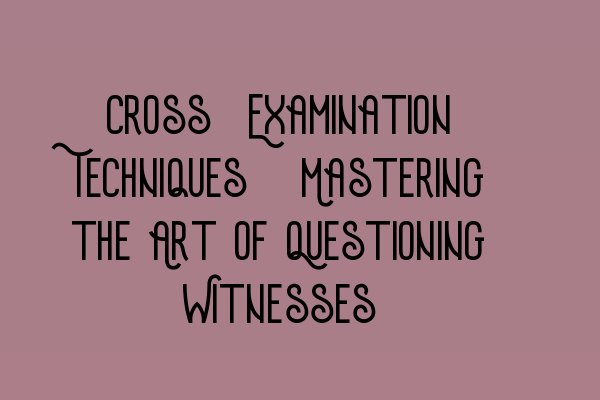Cross-Examination Techniques: Mastering the Art of Questioning Witnesses
questioning witnesses
cross-examination techniques
witness questioning
examination of witnesses
legal questioning
effective cross-examination
Introduction
In the field of criminal law, cross-examination plays a crucial role in uncovering the truth and presenting a strong case. Mastering the art of questioning witnesses during cross-examination requires a deep understanding of legal principles and effective techniques. In this article, we will explore some essential cross-examination techniques that every solicitor should master to achieve success in the courtroom.
1. Preparation is Key
Effective cross-examination starts long before you step into the courtroom. Thoroughly prepare your case by reviewing the evidence, witness statements, and relevant case law. This will allow you to identify the key points to address during cross-examination and develop a strategic approach.
2. Begin with Open-Ended Questions
When you start cross-examining a witness, begin with open-ended questions that allow them to provide detailed answers. This technique can help you gather information and gain insight into the witness’s perspective. It also gives you the opportunity to build rapport with the witness and establish credibility.
3. Control the Witness’s Response
As the cross-examiner, it’s crucial to maintain control over the witness’s responses. You can achieve this by asking leading questions that limit the witness’s ability to elaborate or provide additional information. Leading questions also enable you to guide the witness towards the desired outcome and highlight inconsistencies in their testimony.
4. Use Impeachment Techniques
Impeachment techniques involve challenging the witness’s credibility or the reliability of their testimony. This can be done by presenting contradictory evidence, prior inconsistent statements, or past behavior that undermines their credibility. By impeaching the witness effectively, you can weaken their testimony and cast doubt on the overall reliability of their account.
5. Stick to One Point at a Time
During cross-examination, it’s crucial to focus on one point at a time. This ensures clarity and prevents the witness from diverting the focus away from the key issues. By systematically addressing each point, you can present a coherent narrative and reinforce your arguments.
6. Listen Carefully
Active listening is an essential skill during cross-examination. Pay close attention to the witness’s answers, body language, and any verbal cues. This allows you to identify inconsistencies, gaps in their testimony, or potential weaknesses that can be exploited during questioning.
7. Stay Calm and Confident
When cross-examining a witness, it’s crucial to maintain composure and project confidence. This not only enhances your credibility but also puts the witness on edge, potentially leading them to reveal more than intended. Stay calm, focused, and professional throughout the cross-examination process.
Conclusion
Mastering the art of questioning witnesses during cross-examination is a fundamental skill for any solicitor practicing criminal law. By following these techniques, you can effectively challenge witness testimony, uncover inconsistencies, and present a compelling case in the courtroom. Remember, thorough preparation, careful questioning, and active listening are key to achieving success in cross-examination.
Related Articles:
- LLC Formation Made Simple: Step-by-Step Guide for UK Entrepreneurs
- Business Regulations in the UK: A Comprehensive Overview
- Preparing for the SQE Exam: Strategies and Resources for Success
- SQE Workshops and Webinars: Accelerate Your Exam Preparation
- Delaware Corporate Law for UK Solicitors: Key Insights and Practices
